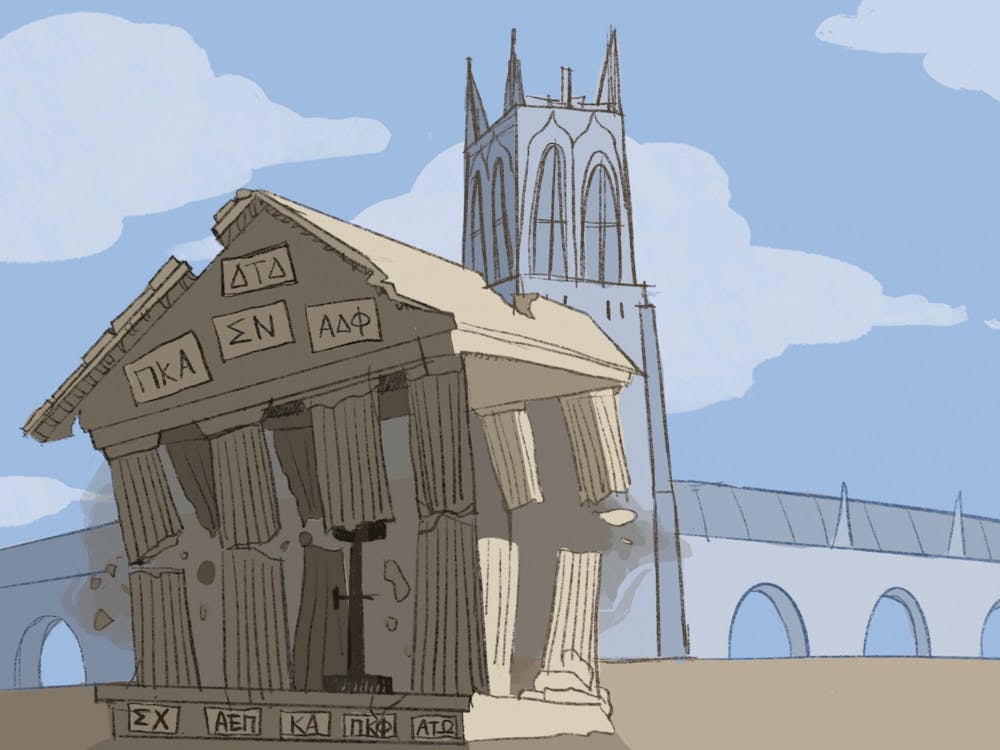Nine fraternities have broken away from Duke’s Interfraternity Council after Duke announced changes to the rush process and selective housing, forming a new group called the Durham Interfraternity Council that has begun recruiting new members.
Here’s what we know so far about fraternity disaffiliations and what they mean for the Duke community.
Which fraternities have disaffiliated?
By Feb. 16, seven fraternities had disaffiliated from the Duke IFC: Alpha Delta Phi, Alpha Tau Omega, Delta Tau Delta, Kappa Alpha Order, Pi Kappa Phi, Sigma Chi and Sigma Nu. Alpha Epsilon Pi and Pi Kappa Alpha disaffiliated later last week.
All nine fraternities have joined the newly-formed Durham Interfraternity Council.
Why did fraternities decide to disaffiliate?
In November, Duke announced that recruitment for first-years would be delayed to sophomore year and that only juniors and seniors would live in selective living sections next year. These changes are part of the guidelines for Duke’s Next Generation Living Learning 2.0 Committee.
According to Durham IFC President Will Santee, a junior, these changes posed a number of challenges to fraternities. Primarily, delaying rush to sophomore fall would be difficult “especially since so many juniors go abroad” and limiting selective living sections to juniors and seniors “wasn’t exactly conducive to the best living situation for sophomores,” Santee said.
Former Duke IFC President Rohan Singh, a senior, claimed that the IFC was not consulted by Duke when the University temporarily suspended spring recruitment in October and decided to move rush to sophomore year in November.
Mary Pat McMahon, vice provost and vice president of student affairs, said that IFC was the first student group she met with to seek input on changes to rush. She added that she consulted national Greek organizations, Duke Student Government and dozens of other student groups in more than 100 preview meetings before the November policy announcement.
Santee said that the former Duke IFC brought their grievances to meetings with Duke administrators, but “got the impression that those rules were not going to be changed just because we said we don’t like them.”
He said that it seemed as though the University “has a very set plan of where they see social life going at Duke” and the disaffiliated fraternities didn’t feel like that plan included them.
What is the Durham IFC?
According to the Durham IFC’s statement of formation, they are “a coalition of fraternities previously affiliated with the Duke University with the shared goal of creating a fraternity community for Duke students.”
Santee, a member of Kappa Alpha Order, said that Durham IFC is an opportunity to “rewrite the rules of what Greek life looks like at Duke.”
The Durham IFC wrote in the statement that they plan to use their formation “as an opportunity to emphasize our commitment to positive action, as we will expand upon efforts to vastly improve fraternity culture as it pertains to sexual assault, racism, hazing and more.”
According to Santee, the Durham IFC “was a collective idea, but an individual decision for each chapter.”
Each of the now-disaffiliated chapters discussed the idea of disaffiliating among their members and with their respective national organizations before each came to the ultimate decision that joining the Durham IFC would be “most beneficial” to maintain the “integrity and continuation of the chapter,” Santee said.
How will fraternities be held accountable for off-campus actions?
McMahon told The Chronicle last week that disaffiliated groups will not have access to “trainings and group accountability structures set in place for recognized groups.”
Such training and accountability structures have affected the way IFC fraternities interact with issues like sexual assault, hazing and racism in the past. In 2015, for example, the IFC created a task force to investigate sexual assault in Greek life and in 2019, the University disciplined four fraternities for hazing allegations.
Emilie Dye, director of student engagement and leadership, added that disaffiliated fraternities “will no longer have access to University funding, facilities, communications, housing and direct advisement.”
She noted, however, that students who are members of disaffiliated groups will still be held accountable for their off-campus actions, including violations of Duke’s COVID-19 guidelines.
“Duke students are still Duke students, which means that the members of these organizations are still expected to follow all Duke policies [and] procedures,” Dye wrote in an email.
Although the disaffiliated fraternities will not longer have access to Duke trainings and accountability structures, the groups will “continue to receive training and educational resources, be insured and held accountable to policies of their inter/national organizations,” according to Todd Shelton, chief communication officer of the North American Interfraternity Conference. The NIC represents several of the national organizations that encompass the disaffiliating groups.
McMahon added that she is confident that new efforts by the University to train and educate student leaders can help address the gap.
Santee told The Chronicle that all rush participants will attend a required virtual sexual assault prevention training. He wrote in an email that the training will share content from the Women’s Center Training given to all affiliated Duke selective living groups “as well as material specifically created for future fraternity members.”
How will fraternity recruitment work this year?
Santee said the Durham IFC expects a fully virtual recruitment process this year. He said that the rush schedule was designed to be completely virtual, with “no need for events occurring outside of that.”
Following an organization-wide Zoom information session on Sunday, Santee said that the rush process will involve one-on-one virtual conversations and final presentations hosted by individual chapters over Zoom. Bids will be given out virtually on March 2 and returned March 3, he said.
According to Santee, all rush participants will also be required to attend a virtual sexual assault training—similar to the Women’s Center training given to all affiliated Duke selective living groups and also include “material specifically created for future fraternity members.”
Santee added that since the Durham IFC is not a Duke group, they have had “little coordination” with Duke in planning the recruitment process.
What long-term changes will we see to Duke’s living situation and campus culture?
As the fraternities leave, Mary Pat McMahon, vice provost and vice president of student affairs sees an opening to construct a new social culture at Duke.
“There is an opportunity for a reset that builds on our best values and traditions, and sort of gives us a chance to examine some of the structures that we’ve had, and how equitable they've been and what kind of community we’ve created,” McMahon said. “I see a place for selective living at Duke, but I see it as part of the junior and senior year experience, not as part of the first structure around which the rest of upperclassmen housing works.”
Santee said that although the Durham IFC hopes to rebuild a partnership and communication with Duke in the future, it isn’t their primary objective right now. Instead, the organization is currently focused on “becoming independent and functional on [their] own” and running recruitment this semester “without Duke’s help,” Santee said.
Singh said that all the chapters hope to maintain an amicable relationship to the University.
Get The Chronicle straight to your inbox
Signup for our weekly newsletter. Cancel at any time.

Mona Tong is a Trinity senior and director of diversity, equity and inclusion analytics for The Chronicle's 117th volume. She was previously news editor for Volume 116.

Maria Morrison was a digital strategy director for The Chronicle's 117th volume. She was previously managing editor for Volume 116.

